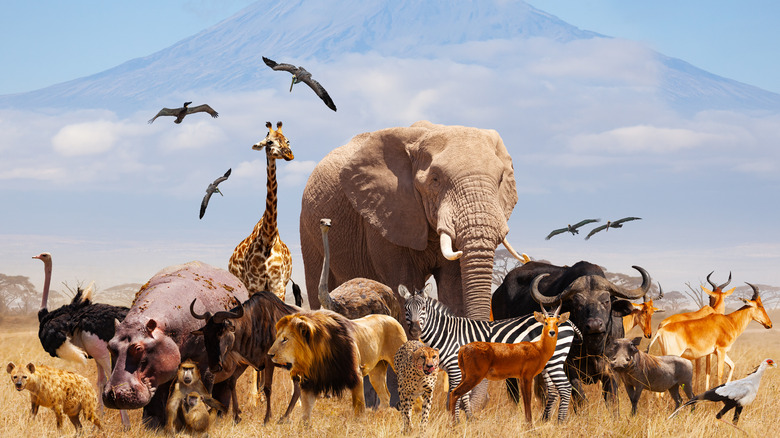Why You Might See Giraffe And Lion Meat On Future Restaurant Menus
Meatless dishes are hitting the menus in fast food joints, Michelin-star restaurants, and everything in between faster than you can say "puma." But curiously, a highly carnivorous food trend is developing at the exact same time. While consumers are being asked to forgo their beef burgers and opt for plant-based versions instead, meat-loving customers are being wooed with the promise of tiger steaks and lion burgers. Yes, these two food trends may seem diametrically opposed — until you learn exactly how these African safari animals are going to wind up on your plate.
If you have a hankering for giraffe ham or zebra sushi, Fine Dining Lovers notes that you can rest easy knowing that no animals will be hurt in the process of making your meal. Yes, you read that right. Your lion burger will not involve hunters slaughtering this luxuriously-maned king of the jungle. This meat has actually never stepped foot in Africa at all. In fact, it's never even had feet.
Eat animal protein without killing a single creature
As it turns out, these unusual animal proteins are being created in a laboratory. According to Fine Dining Lovers, lab-grown meats have enjoyed an increase in popularity, but the offerings so far have been focused on traditional species. Primeval Foods, a company owned by Ace Ventures, hopes to change all that. "It has to go beyond the current beef, chicken, and pork dishes, and it has to come without the expense of nature," Yilmaz Bora, company's managing partner, told LAD Bible. While the idea of being able to eat animals without actually having to kill any will surely appeal to many, how can a lion steak be created in a petri dish?
Often referred to as "clean meat," lab-grown animal proteins involve taking cells from the muscles of the actual animal and "multiplying them dramatically." With time, these cells become "primitive fibers" that then generate more muscle tissue (via Scientific American). The potential benefits of "cellular agriculture," as lab meat is also sometimes called, are numerous. Not only does it protect the animals from harm, but it can also help address the need to feed our increasingly exploding global population. People who previously eschewed eating anything with eyes now have the option of enjoying animal proteins without compromising their ethics. Plus, it gives consumers the chance to try foods they may never have considered otherwise.
Lab-produced meats are available now
Lab-produced meat may sound futuristic, but some companies are already selling it. In 2020, Singapore became the first country to authorize the sale of cell-based meat when it granted approval to Eat Just's GOOD Meat Chicken. 1880, a restaurant in Singapore, became the first eatery to carry this type of protein on its menu, per VegNews. Eat Just has also received approval to sell "cultivated" chicken breast, tenders, and shredded chicken products in Singapore.
In November 2021, lab meat company Upside Foods opened a meat-cultivation facility in California. The company now claims it is capable of producing 50,000 pounds of cultured meat each year and will eventually be able to produce 400,000 pounds. It's not just individual companies making strides: In January 2022, Bloomberg reported that the USDA spent $10 million to create the National Institute for Cellular Agriculture, which aims to "turn the U.S. into a leader in manufactured meat."
It seems that giant leaps are being made in an industry that many didn't even know existed. So, if you're feeling adventurous, just know that gnawing on lions and tigers — oh my! — could be in your future.


